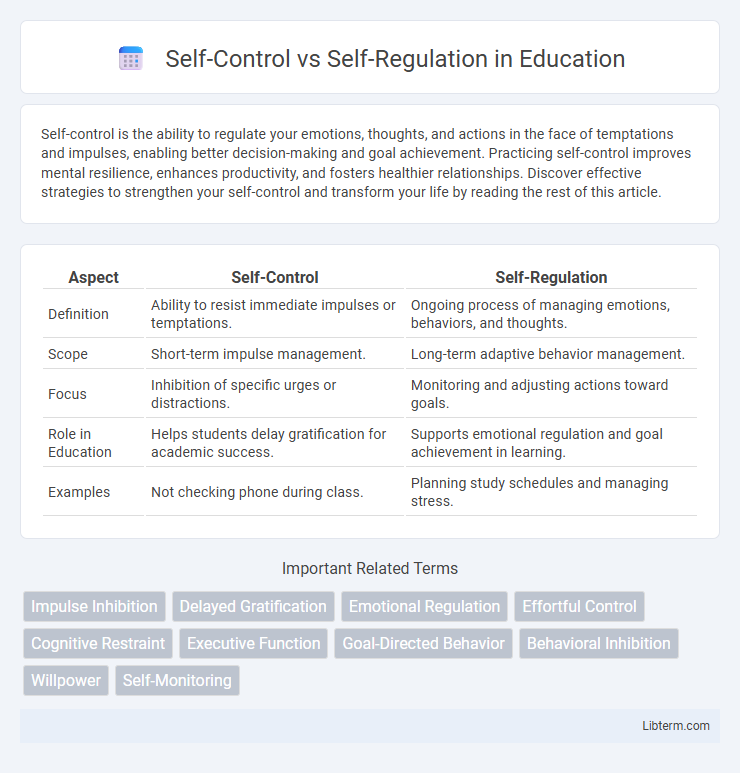Self-control is the ability to regulate your emotions, thoughts, and actions in the face of temptations and impulses, enabling better decision-making and goal achievement. Practicing self-control improves mental resilience, enhances productivity, and fosters healthier relationships. Discover effective strategies to strengthen your self-control and transform your life by reading the rest of this article.
Table of Comparison
| Aspect | Self-Control | Self-Regulation |
|---|---|---|
| Definition | Ability to resist immediate impulses or temptations. | Ongoing process of managing emotions, behaviors, and thoughts. |
| Scope | Short-term impulse management. | Long-term adaptive behavior management. |
| Focus | Inhibition of specific urges or distractions. | Monitoring and adjusting actions toward goals. |
| Role in Education | Helps students delay gratification for academic success. | Supports emotional regulation and goal achievement in learning. |
| Examples | Not checking phone during class. | Planning study schedules and managing stress. |
Introduction to Self-Control and Self-Regulation
Self-control refers to the ability to resist immediate impulses and temptations to achieve long-term goals, often involving conscious effort and willpower. Self-regulation encompasses a broader process that includes managing emotions, thoughts, and behaviors to adapt to changing circumstances and maintain goal-directed actions. Both concepts play crucial roles in psychological resilience, decision-making, and behavioral adjustment across various contexts.
Defining Self-Control
Self-control refers to the ability to suppress immediate impulses, desires, or temptations to achieve long-term goals or adhere to social norms. It involves conscious effort to inhibit automatic responses and manage emotional reactions in specific situations. This capacity is critical for decision-making, goal achievement, and maintaining discipline across various contexts, from eating habits to financial management.
Understanding Self-Regulation
Self-regulation involves managing emotions, thoughts, and behaviors to achieve long-term goals through adaptive strategies and resilience-building. It encompasses a broader range of processes than self-control, including stress management, impulse inhibition, and motivation regulation, which promote sustained personal growth and well-being. Effective self-regulation relies on awareness, goal-setting, and cognitive flexibility to maintain balance in challenging situations.
Key Differences Between Self-Control and Self-Regulation
Self-control involves resisting immediate temptations or impulses to achieve short-term goals, while self-regulation encompasses a broader process of managing emotions, thoughts, and behaviors over time to achieve long-term objectives. Self-control is often a momentary effort, typically linked to inhibiting reactions, whereas self-regulation involves ongoing strategies such as goal-setting, monitoring progress, and adapting actions. Neuroscientific studies highlight that self-control relies heavily on prefrontal cortex activity for impulse inhibition, whereas self-regulation engages multiple brain regions responsible for planning, emotional regulation, and sustained motivation.
Psychological Mechanisms Involved
Self-control involves the capacity to inhibit impulses and delay gratification by activating the prefrontal cortex, which governs executive functions such as decision-making and attentional control. Self-regulation encompasses broader psychological mechanisms, including emotional regulation, goal setting, and adaptive responses, integrating neural circuits like the anterior cingulate cortex and limbic system for monitoring and adjusting behavior. Both processes rely heavily on neurotransmitters like dopamine and serotonin to modulate motivation, reward processing, and stress response.
Importance in Personal Development
Self-control is crucial in personal development as it enables individuals to resist immediate temptations and maintain focus on long-term goals, fostering discipline and perseverance. Self-regulation encompasses a broader range of skills, including managing emotions, thoughts, and behaviors to adapt to changing circumstances and achieve desired outcomes. Together, these abilities enhance emotional intelligence, decision-making, and overall resilience, making them essential for sustained personal growth and success.
Examples of Self-Control in Everyday Life
Self-control manifests in everyday scenarios such as resisting the temptation to check social media during work hours, choosing healthy meals over junk food, and managing impulses when frustrations arise in conversations. Exercising self-control also involves delaying gratification by saving money instead of impulsive spending and adhering to a workout routine despite fatigue. These examples highlight the capacity to override immediate desires to achieve long-term goals, a key distinction from broader self-regulation processes.
Examples of Self-Regulation in Everyday Life
Self-regulation in everyday life includes managing emotions during stressful situations, such as taking deep breaths to stay calm during a conflict. It also involves setting and adhering to personal goals, like maintaining a consistent exercise routine despite distractions. Another example is delaying immediate gratification by saving money instead of impulsively spending it, demonstrating control over impulses for long-term benefits.
Strategies to Improve Both Skills
Effective strategies to improve self-control include practicing delayed gratification, setting clear and achievable goals, and developing mindfulness to increase awareness of impulses. Enhancing self-regulation involves training emotional management through cognitive reappraisal, establishing routines that promote consistent behavior, and employing time management techniques to maintain focus and productivity. Integrating these approaches strengthens the ability to manage thoughts, emotions, and behaviors systematically, leading to improved decision-making and overall well-being.
Conclusion: Choosing the Right Approach
Effective personal development depends on understanding the difference between self-control and self-regulation, where self-control targets resisting immediate impulses, and self-regulation involves managing emotions and behaviors over time. Choosing the right approach hinges on context: self-control suits short-term challenges, while self-regulation supports long-term goal achievement and emotional resilience. Emphasizing self-regulation cultivates sustainable habits and adaptive strategies essential for lasting success.
Self-Control Infographic

 libterm.com
libterm.com